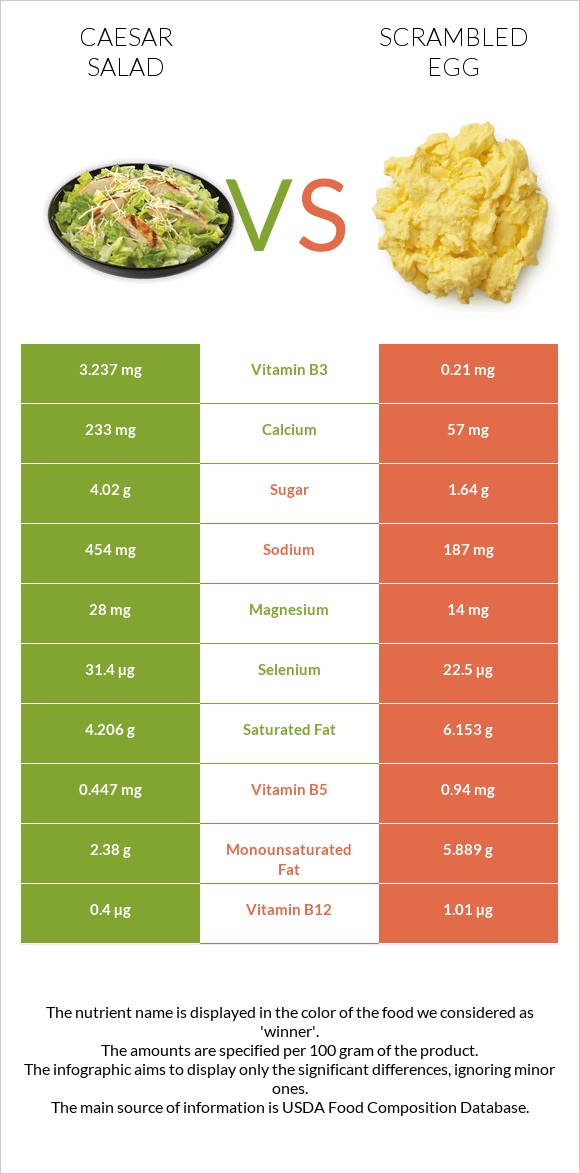Caesar salad vs. Scrambled egg — In-Depth Nutrition Comparison
Compare
A recap on the differences between caesar salad and scrambled egg
- Caesar salad is higher in vitamin B1, vitamin B3, calcium, selenium, and manganese, yet scrambled egg is higher in vitamin B12, vitamin B2, and vitamin B5.
- Scrambled egg covers your daily cholesterol needs 134% more than caesar salad.
- Caesar salad contains 15 times more vitamin B3 than scrambled egg. While caesar salad contains 3.237mg of vitamin B3, scrambled egg contains only 0.21mg.
- The amount of sodium in scrambled egg is lower.
- The glycemic index of scrambled egg is lower.
Food varieties used in this article are LITTLE CAESARS 14" Original Round Cheese Pizza, Regular Crust and Fast foods, egg, scrambled.
Infographic

Infographic link
Mineral Comparison
Mineral comparison score is based on the number of minerals by which one or the other food is richer. The "coverage" charts below show how much of the daily needs can be covered by 300 grams of the food.
| Contains more MagnesiumMagnesium | +100% |
| Contains more CalciumCalcium | +308.8% |
| Contains more PotassiumPotassium | +15.6% |
| Contains more CopperCopper | +88.1% |
| Contains more ManganeseManganese | +646.5% |
| Contains more SeleniumSelenium | +39.6% |
| Contains more IronIron | +10.7% |
| Contains less SodiumSodium | -58.8% |
Vitamin Comparison
Vitamin comparison score is based on the number of vitamins by which one or the other food is richer. The "coverage" charts below show how much of the daily needs can be covered by 300 grams of the food.
| Contains more Vitamin B1Vitamin B1 | +371.3% |
| Contains more Vitamin B3Vitamin B3 | +1441.4% |
| Contains more Vitamin CVitamin C | +∞% |
| Contains more Vitamin AVitamin A | +125.6% |
| Contains more Vitamin EVitamin E | +57.4% |
| Contains more Vitamin DVitamin D | +∞% |
| Contains more Vitamin B2Vitamin B2 | +75.1% |
| Contains more Vitamin B5Vitamin B5 | +110.3% |
| Contains more Vitamin B12Vitamin B12 | +152.5% |
| Contains more Vitamin KVitamin K | +52.5% |
All nutrients comparison - raw data values
| Nutrient |  |
 |
DV% diff. |
| Cholesterol | 24mg | 426mg | 134% |
| Choline | 180.6mg | 33% | |
| Vitamin B1 | 0.377mg | 0.08mg | 25% |
| Vitamin B12 | 0.4µg | 1.01µg | 25% |
| Vitamin B3 | 3.237mg | 0.21mg | 19% |
| Calcium | 233mg | 57mg | 18% |
| Vitamin B2 | 0.297mg | 0.52mg | 17% |
| Selenium | 31.4µg | 22.5µg | 16% |
| Vitamin B6 | 0.19mg | 15% | |
| Sodium | 454mg | 187mg | 12% |
| Manganese | 0.321mg | 0.043mg | 12% |
| Vitamin A | 78µg | 176µg | 11% |
| Fats | 9.54g | 16.18g | 10% |
| Carbs | 31.5g | 2.08g | 10% |
| Starch | 25.29g | 10% | |
| Vitamin B5 | 0.447mg | 0.94mg | 10% |
| Saturated fat | 4.206g | 6.153g | 9% |
| Monounsaturated fat | 2.38g | 5.889g | 9% |
| Fiber | 1.7g | 0g | 7% |
| Copper | 0.126mg | 0.067mg | 7% |
| Folate | 29µg | 7% | |
| Vitamin D | 0 IU | 46 IU | 6% |
| Vitamin D | 0µg | 1.1µg | 6% |
| Vitamin C | 0mg | 3.3mg | 4% |
| Calories | 265kcal | 212kcal | 3% |
| Magnesium | 28mg | 14mg | 3% |
| Iron | 2.34mg | 2.59mg | 3% |
| Vitamin K | 5.9µg | 9µg | 3% |
| Polyunsaturated fat | 1.461g | 1.969g | 3% |
| Phosphorus | 231mg | 242mg | 2% |
| Vitamin E | 0.61mg | 0.96mg | 2% |
| Protein | 13.39g | 13.84g | 1% |
| Potassium | 170mg | 147mg | 1% |
| Fructose | 1.13g | 1% | |
| Net carbs | 29.8g | 2.08g | N/A |
| Sugar | 4.02g | 1.64g | N/A |
| Zinc | 1.61mg | 1.66mg | 0% |
| Tryptophan | 0.15mg | 0.212mg | 0% |
| Threonine | 0.393mg | 0.657mg | 0% |
| Isoleucine | 0.547mg | 0.836mg | 0% |
| Leucine | 1.137mg | 1.185mg | 0% |
| Lysine | 0.523mg | 0.913mg | 0% |
| Methionine | 0.3mg | 0.427mg | 0% |
| Phenylalanine | 0.717mg | 0.75mg | 0% |
| Valine | 0.7mg | 0.96mg | 0% |
| Histidine | 0.36mg | 0.325mg | 0% |
| Omega-3 - ALA | 0.155g | N/A |
Macronutrient Comparison
Macronutrient breakdown side-by-side comparison
Protein:
13.39 g
Fats:
9.54 g
Carbs:
31.5 g
Water:
43.39 g
Other:
2.18 g
Protein:
13.84 g
Fats:
16.18 g
Carbs:
2.08 g
Water:
66.7 g
Other:
1.2 g
| Contains more CarbsCarbs | +1414.4% |
| Contains more OtherOther | +81.7% |
| Contains more FatsFats | +69.6% |
| Contains more WaterWater | +53.7% |
~equal in
Protein
~13.84g
Fat Type Comparison
Fat type breakdown side-by-side comparison
Saturated fat:
Sat. Fat
4.206 g
Monounsaturated fat:
Mono. Fat
2.38 g
Polyunsaturated fat:
Poly. Fat
1.461 g
Saturated fat:
Sat. Fat
6.153 g
Monounsaturated fat:
Mono. Fat
5.889 g
Polyunsaturated fat:
Poly. Fat
1.969 g
| Contains less Sat. FatSaturated fat | -31.6% |
| Contains more Mono. FatMonounsaturated fat | +147.4% |
| Contains more Poly. FatPolyunsaturated fat | +34.8% |





